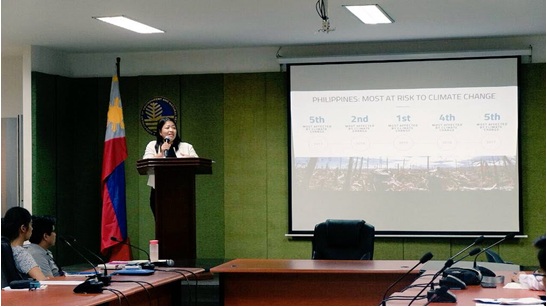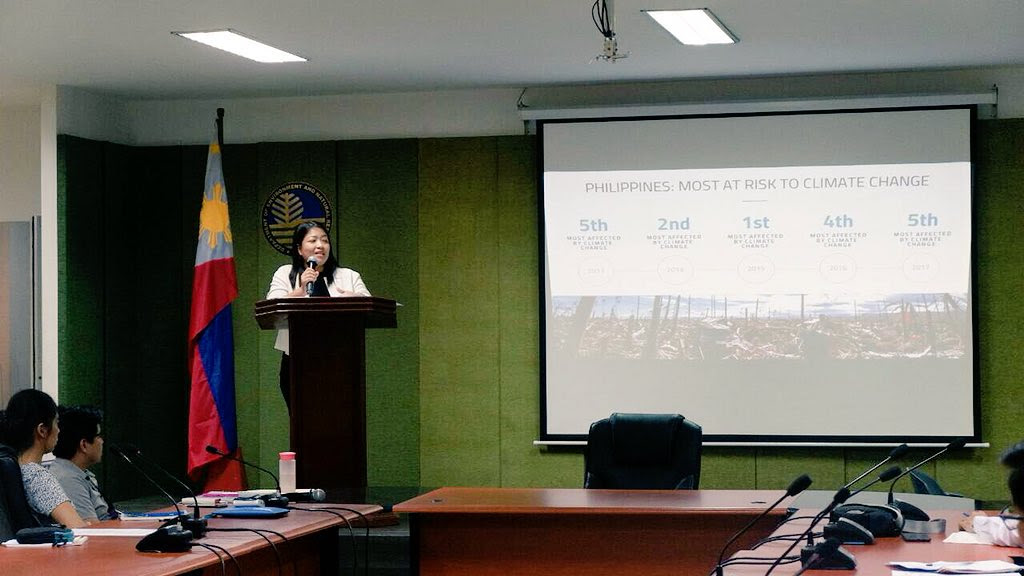
February 21, 2018 Wednesday


Lone female Climate Change Commissioner Rachel S. Herrera delivers a message at the Briefing on Climate Change and Paris Agreement (PA), hosted by the Legal and Legislative Affairs of the Department of Environment and Natural Resources (DENR) on February 21, 2018.
Commissioner Rachel S. Herrera was recently appointed by President Rodrigo R. Duterte, pursuant to the law requiring a female commissioner for the Climate Change Commission (CCC).
“The aspect on gender is one of the important points in the Philippine position in the Paris Agreement negotiations—to consider the impacts on vulnerable groups, such as women, children, the elderly, and indigenous peoples,” said Commissioner Rachel S. Herrera of the Climate Change Commission during the Briefing on Climate Change and the Paris Agreement at the Department of Environment and Natural Resources (DENR).
Herrera cited the study of the World Health Organization (WHO) that the impacts of natural hazards brought about by climate change tend to kill more women than men, particularly women at a young age. She added that there is increased risk of sexual harassment and sexual-related violence against women in temporary shelters and evacuation centers.
“As the female Commissioner in the CCC, I must put emphasis on the gender perspective in our climate change advocacy and agenda. We have successfully championed this element in the Paris Agreement, and we certainly need to reflect this in our country’s climate policies and plans,” Herrera said.
“We need to continue advocating for climate justice—a call for greater and more ambitious climate action from all countries. We should do all that we can to limit global temperature rise to 1.5 degrees Celsius. We should also demand financial assistance and technology cooperation from developed nations to build resilience in developing countries, like ours, that have taken the brunt of impacts of climate change,” Herrera added.
Hailing from Davao in Mindanao, Herrera saw firsthand how her hometown used to be considered “typhoon-free" but in recent years had been devastated by typhoons such as Pablo ('Bopha') and frequent flooding. Overall, the Philippines has remained in the top 5 most at risk to natural hazards considered climate-related, such as typhoons, flooding, and landslides.
Herrera noted that the National Economic and Development Authority (NEDA) has estimated that the annual average cost of disasters to the Philippine economy is Php206 Billion. She added that if climate change risks are not addressed, the Philippines stands to lose 6% of its GDP annually by 2100, as reported by the Asian Development Bank.
The Commissioner also provided context on the impacts of climate change and their effects to the environment and society, such as decline in rice yield, coral degradation, threatened biodiversity and natural ecosystems, more intense and prolonged droughts, higher sea level rise, decline in labor productivity, more public health emergencies, and water scarcity.
“We are more than glad to sustain partnerships with the Department of Environment and Natural Resources (DENR), other agencies, the private sector, and stakeholders in order to win this fight against climate change. As part of our commitment to the Paris Agreement, we have facilitated a bottom-up approach to developing the country’s Nationally Determined Contributions (NDC),” Herrera said.
Herrera said that the NDC is the country’s roadmap on how to transition towards a low carbon economy, which will be submitted to the United Nations Framework Convention on Climate Change (UNFCCC) this year.
In 2017, the Commission conducted a total of 15 consultations, validation meetings, and workshops on the NDC sectoral targets and adaptation and mitigation options for the agriculture, waste, industry, transportation, forestry, and energy sectors. An initial draft of the NDC is already at hand and set for promulgation this year.
“As we deepen our knowledge and understanding on climate change and the Paris Agreement, may this inspire us to heed the call to act now and do more for our country, our children, and their future,” Herrera concluded.